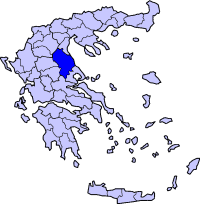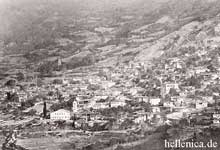|
|
Ampelakia or Ambelakia (Αμπελάκια) is a community in the Larissa Prefecture, Greece. Population 510 (2001) Ampelakia is 34 km NE of Larissa. The village was founded probably in the 16th century. It was destroyed by forces of Ali Pascha in the year 1811. Famous is the mansion of Georgios Schwartz in Ampelakia build at the end of the 18th century. It was the haedquarters of the Cooperative "Koini Syntrofia" with around 6000 members.
Division of the community
Mansion of Georgios Schwartz at Ambelakia Historical Population Year Population 1466 20 households
Population of Ampelakia Murrays Handbook of Travels 1854 Ampelakia. All the heights around this place are covered with vineyards , whence the name is derived. The wine made here resembles claret. The town hangs upon the side of the mountain above the pass of Tempe. It was formerly situated lower down towards the defile, but the inhabitants removed hither, to avoid the incursions of the Turkish troops. Many of the inhabitants of this secluded spot were formerly Germans, though they wore the Eastern dress. There was a staple manufactory here for dyeing thread of a red colour, which supported and enriched the inhabitants, and gave rise to a very considerable commerce. At the end of the 18th century, when Ampelakia was visited by Beaujour, he gave the following account of it: " Ampelakia, by its activity, appears rather a borough of Holland than a village of Turkey. This village spreads' by its industry, movement and life over the surrounding country, and gives birth to an immense commerce, which unites Germany to Greece by a thousand threads. Its population now (1798) amounts to 4000, having trebled in 15 years. In this village are unknown both the vices and cares engendered by idleness ; the hearts of the Ampelakiotes are pure, and their faces serene : the slavery which blasts the plains, watered by the Peneus, has never ascended the sides of Pelion (Ossa) ; and they govern themselves like their ancestors by their primates and other magistrates. Twice the Mussulmans of Larissa attempted to scale their rocks, and twice were they repulsed by hands which dropped the shuttle to seize the musket. Every arm, even those of the children, is employed in the factories : whilst the men dye the cotton, the women prepare and spin it. There are 24 factories, in which yearly 6138 cwts. of cotton yarn are dyed. This yarn finds its way into Germany, and is disposed of at Buda, Vienna, Leipsic, Dresden, Anspach, Bayreuth. The Ampelakiote merchants had houses of their own in all these places. These houses belonged to different associations at Ampelakia. The competition thus established reduced the common profits; they proposed therefore to unite under one central administration. Twenty years ago this plan was suggested, and a few years after it was carried into execution. The lowest shares in this joint stock were 5000 piastres and the highest were restricted to 20,000, that the capitalist might not swallow up the profits. The workmen subscribed their little profits, and, uniting in societies, purchased single shares, and, besides their capital, their labour was reckoned in the general amount. The dividends were at first restricted to 10 per cent., and the surplus was applied to augmenting the capital, which in 2 years was raised from 600,000 to 1,000,000 piastres. Three directors, under an assumed firm, managed the affairs of the company ; but the signature was also confided to three associates at Vienna, whence the returns were made. These 2 firms had their correspondents at Pest, Trieste, Leipsic, Salonica, Constantinople, and Smyrna, to receive their own staple, effect the return, and to extend the market for the cotton yarn of Greece. An important part of the trust was to circulate the funds realized, from hand to hand, and from place to place, according to their own circumstances, necessities, and the rates of exchange. The greatest harmony long reigned in the association ; the directors were disinterested, the correspondents zealous, and the workmen laborious. The company's profits increased every day, on a capital which had rapidly become immense."
Retrieved from "http://en.wikipedia.org/"
 |
|
|||||||||||||
|
|





